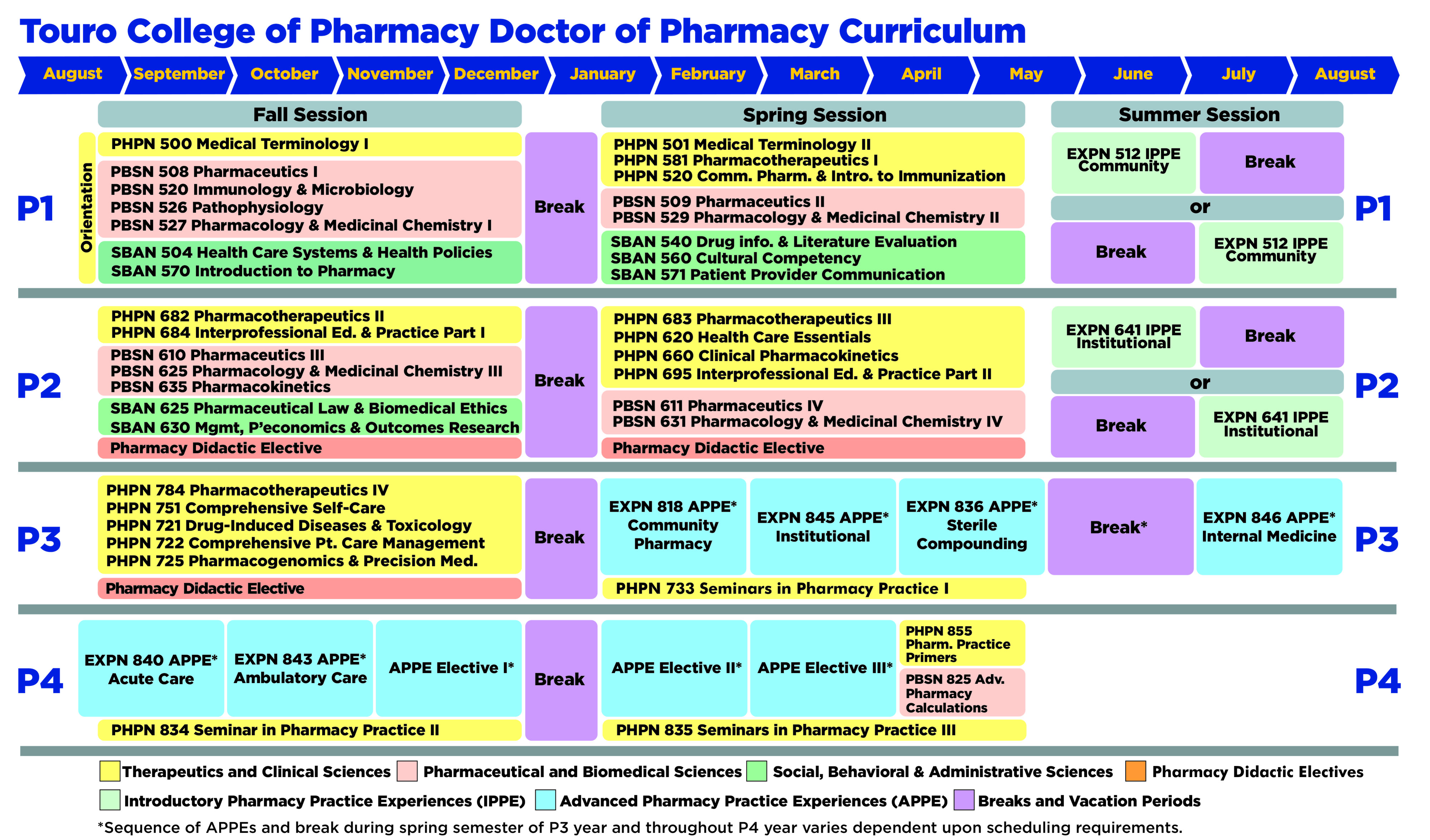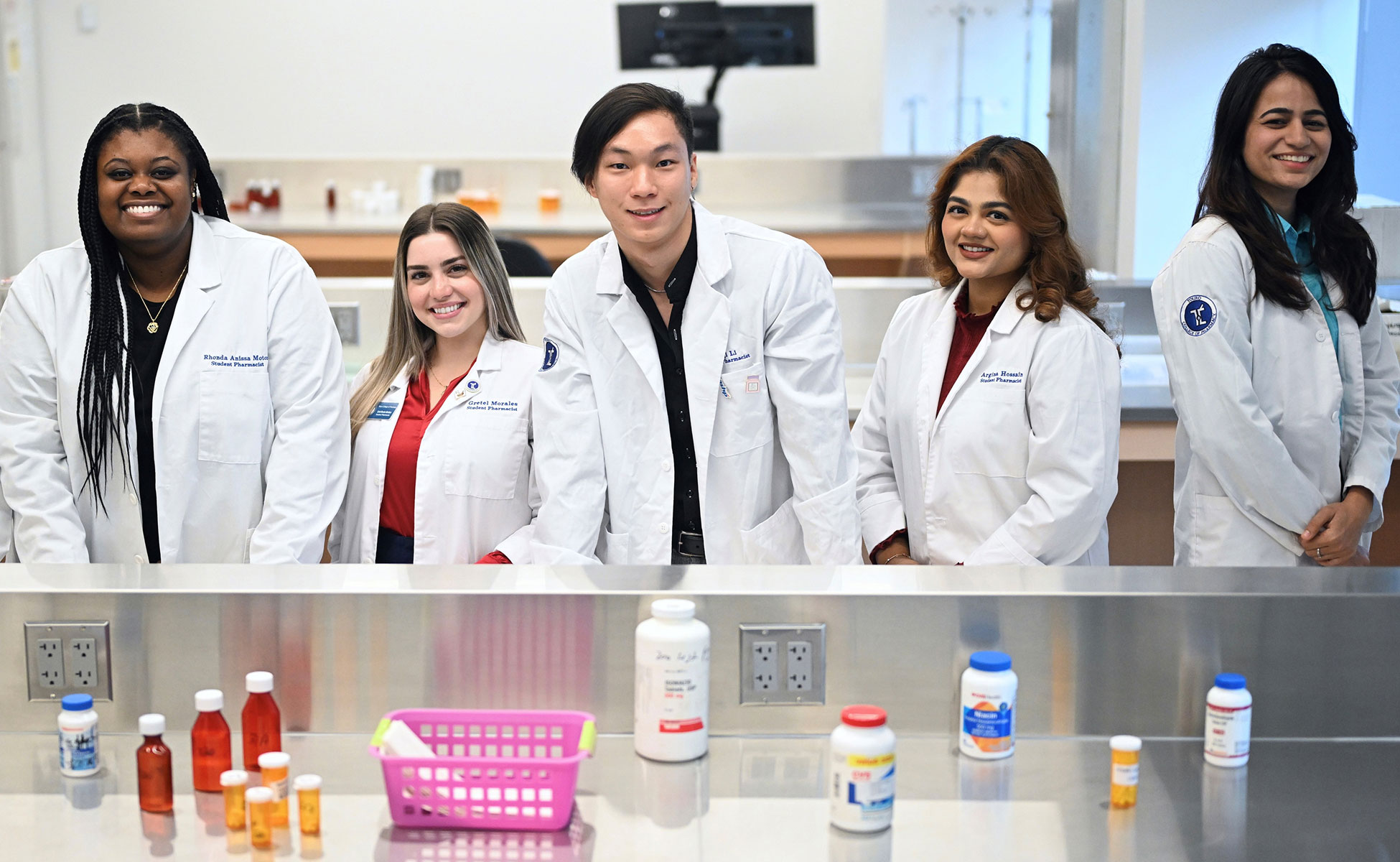Studying at the Touro College of Pharmacy you will see a commitment to collaborative patient-centered care in diverse communities as the backbone of the curriculum and a common theme throughout your learning. In the didactic coursework you will gain a solid foundation in the biomedical, pharmaceutical, social, behavioral, managerial and clinical sciences that will prepare you to engage in evidence-based practices serving individual and public health needs. You’ll hone these abilities and skills in the classroom and laboratory, with participation in co-curricular opportunities, and immersion in our uniquely comprehensive pharmacy practice experiences.
A central foundation of our philosophy is encouraging our students to a lifetime commitment of continuing professional development through the strategic use of developmental portfolios. Students are encouraged to refine their problem-solving and critical thinking skills utilizing them to turn issues and concerns into opportunities to assume leadership roles and innovative approaches to practice; advocacy for patients and the profession; and playing a key role in addressing the health care needs of today and tomorrow.
The Pharmacist Patient Care Process (PPCP) model is central to our curriculum and you will find it referenced throughout your pharmacy education. You’ll find certain sequences in the didactic curriculum that build on one another - pharmacology, medicinal chemistry, pharmaceutics – adding complexity as you gain deeper understanding, and you’ll find certain themes, such as patient safety and communication skills, integrated and repeated continuously. Alongside classroom learning you’ll experience a co-curriculum focused on your professional development as a leader and advocate, interprofessional education, and practice experiences that will mold you into a pharmacist able to meet the needs of your patient, community and health system.

The P1 year starts in the Fall with orientation and is followed by the Fall Session which includes the following course in the Therapeutics and Clinical Sciences: PHPN 500 Medical Terminology I; the following courses in the Pharmaceutical and Biomedical Sciences: PBSN 520 Immunology and Microbiology, PBSN 527 Pharmacology and Medicinal Chemistry I, PBSN 526 Pathophysiology, PBSN 508 Pharmaceutics I ; and the following courses in Social, Behavioral and Administrative Sciences: SBAN 570 Introduction to Pharmacy, SBAN 504 Health Care Systems and Health Policies. The Fall Session is followed by a break between December and January. The Spring Session starts in January and includes the following courses in the Therapeutics and Clinical Sciences: PHPN 501 Medical Terminology II, PHPN 581 Pharmacotherapeutics I; PHPN 520 Community Pharmacy and Intro to Immunization Practice; the following courses in the Pharmaceutical and Biomedical Sciences: PBSN 529 Pharmacology and Medicinal Chemistry II, PBSN 509 Pharmaceutics II; and the following courses in Social, Behavioral and Administrative Sciences: SBAN 540 Drug Information and Literature Evaluation, SBAN 560 Cultural Competency, SBAN 571 Patient Provider Communication. The Spring Session is followed by two Summer Sessions. One session runs from mid-May until July, and the second runs from the beginning of July until mid-August. Each P1 student will complete EXPN 512 IPPE Community Pharmacy during one of the two Summer Sessions and will be on break during the other Summer Session, followed by the start of P2 year in mid-August.
The Fall Session of the P2 year begins mid-August and includes the following courses in the Therapeutics and Clinical Sciences: PHPN 682 Pharmacotherapeutics II, PHPN 684 Interprofessional Education and Practice Part I; the following courses in the Pharmaceutical and Biomedical Sciences: PBSN 610 Pharmaceutics III, PBSN 625 Pharmacology and Medicinal Chemistry III, PBSN 635 Pharmacokinetics; and the following courses in Social, Behavioral and Administrative Sciences: SBAN 630 Management, Pharmacoeconomics & Outcomes Research, SBAN 625 Pharmaceutical Law and Biomedical Ethics. Students can choose to take one of their two Pharmacy Didactic Electives during the P2 Fall Session. The Fall Session is followed by a break between December and January. The Spring Session starts in January and includes the following courses in the Therapeutics and Clinical Sciences: PHPN 683 Pharmacotherapeutics III, PHPN 620 Healthcare Essentials: Physical Assessment and Injection Practice, PHPN 660 Clinical Pharmacokinetics, PHPN 695 Interprofessional Education and Practice Part II; and the following courses in the Pharmaceutical and Biomedical Sciences: PBSN 611 Pharmaceutics IV, PBSN 631 Pharmacology and Medicinal Chemistry IV. Students can choose to take one of their two Pharmacy Didactic Electives during the P2 Spring Session. The Spring Session is followed by two Summer Sessions. One session runs from mid-May until July, and the second runs from the beginning of July until mid-August. Each P2 student will complete EXPN 641 IPPE Institutional Pharmacy during one of the two Summer Sessions and will be on break during the other Summer Session, followed by the start of P3 year in mid-August.
The Fall Session of the P3 year begins mid-August and includes the following courses in the Therapeutics and Clinical Sciences: PHPN 784 Pharmacotherapeutics IV, PHPN 751 Comprehensive Self-Care, PHPN 721 Drug-Induced Diseases & Toxicology, PHPN 722 Comprehensive Patient Care Management, PHPN 725 Pharmacogenomics and Precision Medicine. Students can choose to take one of their two Pharmacy Didactic Electives during the P3 Fall Session. The Fall Session is followed by a break between December and January.
The P3 Spring Session starts in January and begins the series of Advanced Pharmacy Practice Experiences. From January of the P3 year extending until the next April of the P4 year, students will complete nine 6-week APPE rotations. Students will have the ability to take one 6-week block break depending on scheduling, and there will be another break between December and January of the P4 year. Additionally, there are three didactic seminar courses that run simultaneously, one per session (P3 Spring, P4 Fall, P4 Spring). The nine APPE rotations include six core requirements: EXPN 818 APPE Community Pharmacy, EXPN 845 APPE Institutional, EXPN 836 APPE Sterile Compounding, EXPN 846 Internal Medicine, EXPN 840 APPE Acute Care, EXPN 843 APPE Ambulatory Care. The remaining three APPEs include electives of the student’s choice. All APPE scheduling varies dependent upon schedule requirements. Students will complete the course PHPN 733 Seminars in Pharmacy Practice I during the P3 Spring Session, PHPN 834 Seminars in Pharmacy Practice II during the P4 Fall Session, and PHPN 835 Seminars in Pharmacy Practice III during the P4 Spring Session.
After completing all APPEs, P4 students return to campus during April of the P4 Spring Session to complete two final courses from the Therapeutics and Clinical Sciences: PHPN 855 Pharmacy Practice Primers and PHPN 820 Advanced Pharmacy Calculations. These courses run until mid-May, the end of the Spring Session.
Download the TCOP curriculum overview.
Pharmacist Patient Care Process Model
The Pharmacist Patient Care Process (PPCP) uses the principles of evidence-based practice for pharmacists to provide the following services 1. Collect 2. Assess 3. Plan 4. Implement 5. Follow Up: Monitor and Evaluate while keeping the patient at the center of each of these steps. It is a continuous patient-centered process conducted in collaboration with the patient, family and other providers on the health care team, in an effort to optimize patient health and medication outcomes.
The PPCP Model is introduced in your first year and then spirals throughout your clinical coursework.
At the core of the PPCP is the establishment of a patient–pharmacist relationship, and care is delivered using a patient-centered approach.
Continuing Professional Development and Portfolios
Continuing Professional Development (CPD) is a model that is intended to support a lifelong learning habit. CPD is intended to be self-directed, ongoing and focused on lifelong learning. It involves engagement in both formal and informal learning activities that support continued competence, enhanced professionalism, and achievement of goals.
The Accreditation Council for Pharmacy Education (ACPE) has defined CPD as a cyclical process and has illustrated it as follows:
Touro College of Pharmacy facilitates the use of the CPD by helping you to consider your learning needs and tailoring your learning through your choice of co-curricular activity participation. With the guidance of a personal faculty adviser, you will keep a portfolio documenting your growth and change over the course of your time in the PharmD program. These developmental portfolios will help you to reflect, plan, learn, and evaluate your knowledge through documentation and review. This will help you to make sure you’re on track to become the compassionate, qualified, and dynamic pharmacist you want to be.
Through the portfolio program, you will select and submit samples of projects and assessments from your classroom, pharmacy practice experiences, and co-curricular activities that document your growth and achievement of TCOP’s Outcomes of the PharmD Program. This portfolio will become a valuable asset when you enter the job market and beyond!


